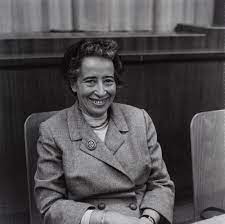Arendt, Hannah

Bio: (1906-1975) German political philosopher, political scientist, and sociologist. Hannah Arendt received her doctorate from the University of Heidelberg, but she was not allowed to have a habilitation there due to her Jewish origin. Since she had to leave Germany due to the Nazis coming to power, she first went to Paris, and then in 1941, she emigrated to the United States. There she has taught at Berkeley, Princeton, Columbia, and Northwestern universities.
Arendt was mostly concerned with the analysis of totalitarianism, political power, authority, as well as freedom. In her book The Origins of Totalitarianism (1951), the author views Stalinism and Nazism as related systems and explains their rise through anti-Semitism and imperialism. She sees racism and unlimited expansionism as the main supports for imperialism. She attributes the rise of totalitarianism to the disintegration of the nation-state. Arendt believes that the main features of totalitarianism are propaganda and terror, as well as the transformation of social classes into the masses.
Her book The Human Condition (1958) is a description of the historical development of the conditions of human existence. Her theory of political action is highly developed in this book. She believes that the emphasis placed on the welfare state is wrong, and that people should lead, what she called, an "active life" (viva activa), which is based on the idea of work, civic engagement, and political action. In Eichmann in Jerusalem: A Report on the Banality of Evil (1963a), Arendt describes the capture of the Nazi criminal Adolf Eichmann in Argentina and his trial in Israel. In this book, the author investigates the causes of evil and concludes that evil is often not caused by the sadistic character of a person, but that it is, in fact, a consequence of the tendency of ordinary people to carry out orders and conform to the masses.
In her book On Revolution (1963b), Hannah Arendt studies the different historical paths of the American and French revolutions. In France, due to great poverty and hunger, revolutionaries were more focused on achieving economic and material goals and less on achieving freedom, while American colonists lived in economic prosperity and sought only to achieve political freedom. The differences in these initial conditions of the two revolutions led to a completely different development of political life in these two countries, and Arendt believes that only the American Revolution was successful.
Fields of research
Aggression Authority Citizenship Civil Society Colonialism Crisis Crowd Dictatorship Ethnicity Freedom History Identity Personality Politics Poverty Power, Political Propaganda Protests Race Revolutions Social Policy State Violence Work FascismTheoretical approaches
PhenomenologyMain works
The Origins of Totalitarianism (1951);
The Human Condition (1958);
Between Past and Future: Six Exercises in Political Thought (1961);
Eichmann in Jerusalem: A Report on the Banality of Evil (1963a);
On Revolution (1963b);
Men in Dark Times (1968);
On Violence (1969);
Crises of the Republic: Lying in Politics, Civil Disobedience, On Violence, Thoughts on Politics and Revolution (1972);
The Jew as Pariah: Jewish Identity and Politics in the Modern Age (1978);
Life of the Mind (1978).

